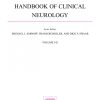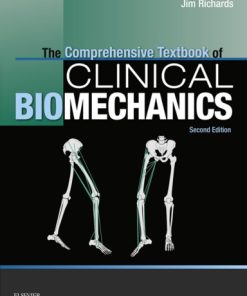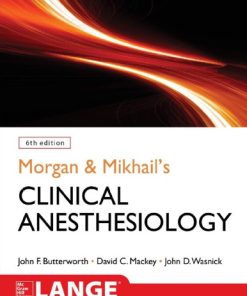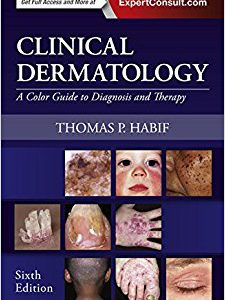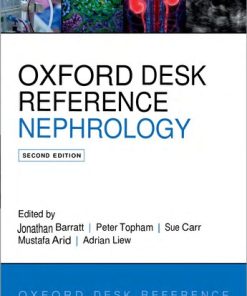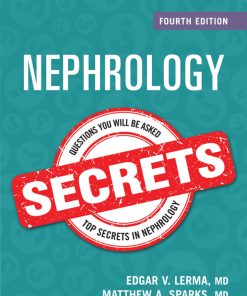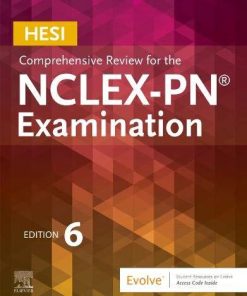Comprehensive Clinical Nephrology 6th Edition by Richard Johnson, John Feehally, Jurgen Floege, Marcello Tonelli 0323547206 9780323547208
$50.00 Original price was: $50.00.$25.00Current price is: $25.00.
Comprehensive Clinical Nephrology 6th Edition by Richard J. Johnson, John Feehally, Jurgen Floege, Marcello Tonelli – Ebook PDF Instant Download/DeliveryISBN: 0323547206, 9780323547208
Full download Comprehensive Clinical Nephrology 6th Edition after payment.
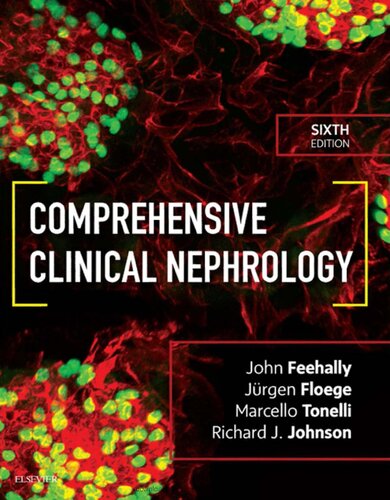
Product details:
ISBN-10 : 0323547206
ISBN-13 : 9780323547208
Author : Richard J. Johnson, John Feehally, Jurgen Floege, Marcello Tonelli
Written and edited by world leaders in nephrology, Comprehensive Clinical Nephrology, 6th Edition, by Drs. John Feehally, Jurgen Floege, Richard J. Johnson, and Marcello Tonelli, provides current information on clinical procedures and conditions as well as the scientific facts and pathophysiology that are foundational to nephrology practice. Ideal for practicing nephrologists, fellows, residents, and internists, it thoroughly covers fluids and electrolytes, hypertension, diabetes, dialysis, and transplantation, and more – all in a single convenient volume.
Comprehensive Clinical Nephrology 6th Table of contents:
Section I Essential Renal Anatomy and Physiology
1 Renal Anatomy
Structure of the Kidney
Collecting Duct System
Juxtaglomerular Apparatus
Renal Interstitium
References
Self-assessment Questions
2 Renal Physiology
Glomerular Structure and Ultrastructure
Glomerular Filtration Rate
Measurement of Renal Plasma Flow
Autoregulation of Renal Blood Flow and Glomerular Filtration Rate
Tubular Transport
Transport in Specific Nephron Segments
Glomerulotubular Balance
Countercurrent System
Vasopressin (Antidiuretic Hormone) and Water Reabsorption
Integrated Control of Renal Function
References
Self-assessment Questions
Section II Investigation of Renal Disease
3 Assessment of Glomerular Filtration Rate
Glomerular Filtration Rate
Measurement and Estimation of the Glomerular Filtration Rate
Clearance Measurements
Estimation of the Glomerular Filtration Rate
Creatinine
Cystatin C
Urea and Other Metabolites
Other Low-Molecular-Weight Serum Proteins
Clinical Application of Estimated Glomerular Filtration Rate
Living Kidney Donor Candidates
Drug Dosing
References
Self-Assessment Questions
4 Urinalysis
Definition
The Urine Sample
Physical Characteristics
Chemical Characteristics
Urine Microscopy
Interpretation of Urine Sediment Findings
Automated Analysis of Urine Sediment
References
Self-Assessment Questions
5 Imaging
Ultrasound
Plain Radiography and Intravenous Urography
Retrograde Pyelography
Antegrade Pyelography
Imaging Ileal Conduits
Cystography
Computed Tomography
Magnetic Resonance Imaging
Measurement of Glomerular Filtration Rate
Angiography
Renal Venography
Nuclear Scintigraphy
Positron Emission Tomography
Molecular Imaging
Radiologic Contrast Agents
References
Self-Assessment Questions
6 Renal Biopsy
Indications for Renal Biopsy
Value of Renal Biopsy
Prebiopsy Evaluation
Renal Biopsy Technique
Complications of Renal Biopsy
References
Self-assessment Questions
Section III Fluid and Electrolyte Disorders
7 Disorders of Extracellular Volume
Extracellular Fluid Compartment
Regulation of Extracellular Fluid Homeostasis
Extracellular Fluid Volume Contraction
Extracellular Fluid Volume Expansion
References
Self-Assessment Questions
8 Disorders of Water Metabolism
Physiology of Water Balance
Vasopressin
Quantitation of Renal Water Excretion
Serum Sodium Concentration, Osmolality, and Tonicity
Estimation of Total Body Water
Hyponatremic Disorders
Hypernatremic Disorders
References
Self-assessment Questions
9 Disorders of Potassium Metabolism
Normal Physiology of Potassium Metabolism
Hypokalemia
Hyperkalemia
References
Self-Assessment Questions
10 Disorders of Calcium, Phosphate, and Magnesium Metabolism
Calcium Homeostasis and Disorders of Calcium Metabolism
Hypercalcemia
Hypocalcemia
Phosphate Homeostasis
Hyperphosphatemia
Hypophosphatemia
Magnesium Homeostasis and Disorders of Magnesium Metabolism
Hypomagnesemia and Magnesium Deficiency
References
Self-Assessment Questions
11 Normal Acid-Base Balance
Definition
Net Acid Production
Buffer Systems in Regulation of pH
Respiratory System in Regulation of pH
Renal Regulation of pH
Renal Transport Mechanisms of Hydrogen and Bicarbonate Ions
Regulation of Renal Acidification
References
Self-Assessment Questions
12 Metabolic Acidosis
Definition
Non–Anion Gap (Normal Anion Gap) Metabolic Acidosis
Anion Gap Metabolic Acidosis
Alkali Treatment of Metabolic Acidosis
References
Self-Assessment Questions
13 Metabolic Alkalosis
Definition
Bicarbonate Transport Along the Nephron
Factors Affecting Bicarbonate Reabsorption and Secretion
Pathophysiology of Metabolic Alkalosis
Etiology
Clinical Manifestations
Diagnosis
Treatment
Special Problems in Management
References
Self-assessment Questions
14 Respiratory Acidosis, Respiratory Alkalosis, and Mixed Disorders
Respiratory Acidosis (Primary Hypercapnia)
Respiratory Alkalosis (Primary Hypocapnia)
Mixed Acid-Base Disturbances
References
Self-assessments Questions
Section IV Glomerular Disease
15 Introduction to Glomerular Disease
Definition
Clinical Evaluation of Glomerular Disease
Asymptomatic Urine Abnormalities
Macrohematuria
Nephrotic Syndrome
Nephritic Syndrome
Rapidly Progressive Glomerulonephritis
Etiology
Progressive Chronic Kidney Disease
Treatment of Glomerular Disease
References
Self-assessment Questions
16 Introduction to Glomerular Disease
Histologic Classification
Histopathology
General Mechanisms of Glomerular Injury
Pathogenesis of Specific Glomerular Syndromes
References
Self-Assessment Questions
17 Minimal Change Disease
Epidemiology
Etiology
Pathogenesis
Pathology
Clinical Manifestations
Laboratory Findings
Diagnosis and Differential Diagnosis
Natural History
Treatment
References
Self-assessment Questions
18 Primary and Secondary (Non-Genetic) Causes of Focal and Segmental Glomerulosclerosis
Etiology and Pathogenesis
Epidemiology
Clinical Manifestations
Diagnosis and Differential Diagnosis
Pathology
Natural History and Prognosis
Treatment
Transplantation
References
Self-assessment Questions
19 Inherited Causes of Nephrotic Syndrome
Clinical Features of Nephrotic Syndrome
Monogenic Causes of Nephrotic Syndrome Elucidate Its Pathogenesis
Genotype Phenotype Correlations
Syndromic Proteinuric Renal Disease
Genetic Testing by Whole Exome Sequencing
Specific Therapies for Hereditary Nephrotic Syndrome
Future Directions
References
Self-assessment Questions
20 Membranous Nephropathy
Etiology and Pathogenesis
Epidemiology and Genetics
Clinical and Serologic Manifestations
Pathology
Treatment
Treatment Summary
References
21 Membranoproliferative Glomerulonephritis and Cryoglobulinemic Glomerulonephritis
Membranoproliferative Glomerulonephritis
Cryoglobulinemic Glomerulonephritis
References
Self-assessment Questions
22 Glomerulonephritis Associated With Complement Disorders
C3 Glomerulopathy
References
23 Immunoglobulin A Nephropathy and IgA Vasculitis (Henoch-Schönlein Purpura)
IgA Nephropathy
IgA Vasculitis
References
Self-assessment Questions
24 Anti–Glomerular Basement Membrane Disease and Goodpasture Disease
Etiology and Pathogenesis
Epidemiology
Clinical Manifestations
Pathology
Differential Diagnosis
Natural History
Treatment
Transplantation
Alport Syndrome Post-Transplant Anti–Glomerular Basement Membrane Disease
References
Self-assessment Questions
25 Renal and Systemic Vasculitis
Definition
Small-Vessel Pauci-Immune Vasculitis
Polyarteritis Nodosa
Kawasaki Disease
Takayasu Arteritis and Giant Cell Arteritis
References
Self-Assessment Questions
26 Lupus Nephritis
Definition
Epidemiology
Etiology and Pathogenesis
Pathogenesis of Lupus Nephritis
Clinical Manifestations
Diagnosis and Differential Diagnosis
Renal Biopsy in Systemic Lupus Erythematosus
Pathology
Treatment
Antiphospholipid Antibody Syndrome, Atherosclerosis, and Pregnancy in Lupus Nephritis
End-Stage Renal Disease and Renal Transplantation
References
Self-assessment Questions
27 Renal Amyloidosis and Glomerular Diseases With Monoclonal Immunoglobulin Deposition
Renal Amyloidosis
Dialysis and Transplantation
Monoclonal Immunoglobulin Deposition Disease
Nonamyloid Fibrillary and Immunotactoid Glomerulopathies
Glomerular Lesions Associated With Waldenström Macroglobulinemia and Other Monoclonal Immunoglobulin M-Secreting B Cell Lymphoproliferative Disorders
Other Types of Glomerulonephritis
References
Self-assessment Questions
28 Rare Glomerular Disorders
Mesangial Proliferative Glomerulonephritis Without IgA Deposits
Glomerulonephritis With Rheumatic Disease
Antiphospholipid Antibody Syndrome
Other Uncommon Glomerular Disorders
References
Self-assessment Questions
29 Thrombotic Microangiopathies, Including Hemolytic Uremic Syndrome
Definitions
Laboratory Signs
Pathology
Mechanisms, Clinical Features, and Management of Specific Forms of Thrombotic Microangiopathy
References
Self-Assessment Questions
Section V Diabetic Kidney Disease
30 Pathogenesis, Clinical Manifestations, and Natural History of Diabetic Kidney Disease
Definitions
Pathogenesis of Diabetic Kidney Disease
Epidemiology
Clinical Manifestations and Natural History
Renal Pathology
Diagnosis and Differential Diagnosis
References
Self-Assessment Questions
31 Prevention and Treatment of Diabetic Kidney Disease
Glycemic Control
Emerging Treatments for Diabetic Kidney Disease
Mineralocorticoid Receptor Antagonists
Endothelin Receptor Antagonists
References
32 Management of the Diabetic Patient With Chronic Kidney Disease
Diagnostic Considerations
General Management Considerations
Monitoring Diabetic Renal Disease (Stage CKD3b-5)
Management of Diabetes in Subjects With Stage 3B-5 CKD
Management of Hypertension in the Diabetic Subject With Chronic Kidney Disease
Cardiovascular Complications
Microvascular Complications of Diabetes
Complications From Chronic Kidney Disease
End-Stage Renal Disease
References
Self-assessment Questions
Section VI Hypertension
33 Normal Blood Pressure Control and the Evaluation of Hypertension
Normal Blood Pressure Control
Definition and Classification of Hypertension
Evaluation of Hypertension
References
Self-Assessment Questions
34 Primary Hypertension
Definition
Etiology and Pathogenesis
What Initiates the Renal Inflammatory Response?
Epidemiology
Clinical Manifestations
Pathology
Diagnosis
Natural History
References
Self-Assessment Questions
35 Nonpharmacologic Prevention and Treatment of Hypertension
Prevention
Weight Loss
Physical Activity
Diet
Smoking
Alcohol
Caffeine
Psychological Stress
Adopting Lifestyle Modifications
References
Self-assessment Questions
36 Pharmacologic Treatment of Hypertension
Defining Who Should Receive Pharmacologic Treatment
Blood Pressure Treatment Goals
Guide to Selection of Antihypertensive Agents
References
Self-assessment Questions
37 Evaluation and Treatment of Hypertensive Emergencies and Urgencies
Etiology and Pathogenesis
Epidemiology
Diagnostic Evaluation
Treatment
References
Self-assessment Questions
38 Endocrine Causes of Hypertension
Etiology and Pathogenesis
Epidemiology
Clinical Manifestations
Diagnosis and Differential Diagnosis
Natural History
Treatment
References
Self-Assessment Questions
39 Other Endocrine Causes of Hypertension
Cushing Syndrome
Pheochromocytoma
Adrenal Incidentaloma
Renin-Secreting Tumor
Acromegaly
Hypothyroidism
Hyperthyroidism
Primary Hyperparathyroidism
References
Self-assessment Questions
40 Neurogenic Hypertension, Including Hypertension Associated With Stroke or Spinal Cord Injury
Physiology and Pathophysiology
Specific Syndromes
References
Self-Assessment Questions
Section VII Renovascular Disease
41 Renovascular Hypertension and Ischemic Nephropathy
Normal Renovascular Anatomy
Clinical Syndromes Associated With Renal Vascular Disease
Renovascular Hypertension
Ischemic Renal Disease
Heart Failure and Unstable Cardiac Conditions
Imaging Renovascular Hypertension and Renal Artery Stenosis
Treatment of Atherosclerotic Renal Artery Stenosis and Fibromuscular Dysplasia
Transplant Renal Artery Stenosis
Renal Infarction
Atheroembolic Renal Disease
Renal Vein Thrombosis
References
Self-assessment Questions
Section VIII Pregnancy and Renal Disease
42 Renal Physiology and Complications in Normal Pregnancy
Renal Physiology in Normal Pregnancy
Anatomy
Hemodynamic Changes
Renal Tubular Changes
Renal Complications in Normal Pregnancy
Urinalysis and Microscopy
Urinary Tract Infection
Renal Calculi
Hypertension in Pregnancy
Preeclampsia
Acute Fatty Liver of Pregnancy
Thrombotic Microangiopathy
Acute Kidney Injury
Ovarian Hyperstimulation Syndrome
References
Self-assessment Questions
43 Pregnancy With Preexisting Kidney Disease
The Adverse Effects of Chronic Kidney Disease on Pregnancy
Management Common to All Pregnancy With Preexisting Kidney Disease
Renal Biopsy in Pregnancy
Superimposed Preeclampsia
Assessment of Fetal Well-Being
Timing of Delivery
Course of Chronic Kidney Disease During and After Pregnancy
Management of Specific Renal Disorders During Pregnancy
Dialysis in Pregnancy
Renal Transplantation and Pregnancy
Pregnancy in the Kidney Donor
Summary
References
Self-Assessment Questions
Section IX Hereditary and Congenital Diseases of the Kidney
44 Autosomal Dominant Polycystic Kidney Disease
Definition
Etiology and Pathogenesis
Epidemiology
Phenotypic Variability
Diagnosis
Differential Diagnosis
Clinical Manifestations
Pathology
Treatment
Novel Therapies
Transplantation
References
Self-assessment Questions
45 Other Cystic Kidney Diseases
Autosomal Recessive Polycystic Kidney Disease
Nephronophthisis: Autosomal Dominant Tubulointerstitial Kidney Disease
Medullary Sponge Kidney
Tuberous Sclerosis Complex
Von Hippel–Lindau Disease
Simple Cysts
Solitary Multilocular Cysts
Renal Lymphangiomatosis
Glomerulocystic Kidney Disease
Acquired Cystic Disease
References
Self-assessment Questions
46 Alport Syndrome and Other Familial Glomerular Syndromes
Alport Syndrome
Hereditary Angiopathy with Nephropathy, Aneurysms, and Cramps (HANAC Syndrome)
Thin Basement Membrane Nephropathy
Fabry Disease (Anderson-Fabry Disease)
Nail-Patella Syndrome
References
Self-assessment Questions
47 Inherited Disorders of Sodium and Water Handling
Physiology of Sodium and Water Reabsorption
Disorders of Sodium Handling
Conditions With Hypokalemia, Metabolic Alkalosis, and Low-Normal Blood Pressure
Conditions With Hypokalemia, Metabolic Alkalosis, and Hypertension
Conditions With Hyponatremia, Hyperkalemia, Metabolic Acidosis, and Normal/Low Blood Pressure
A Condition With Hyperkalemia, Metabolic Acidosis, and Hypertension
Inherited Disorders of Water Handling
References
Self-Assessment Questions
48 Fanconi Syndrome and Other Proximal Tubule Disorders
Fanconi Syndrome
Inherited Causes of Fanconi Syndrome
Acquired Causes of Fanconi Syndrome
Familial Glucose-Galactose Malabsorption and Hereditary Renal Glycosuria
Aminoacidurias
Hereditary Defects in Uric Acid Handling
References
Self-Assessment Questions
49 Sickle Cell Diseases and the Kidney
Sickle Cell Disease
Sickle Cell Nephropathy
Clinical Manifestations of Sickle Cell Nephropathy
Urinary Tract Infections
Clinical Syndromes of Renal Impairment
Investigation and Management of Sickle Cell Nephropathy
Renal Replacement Therapy
Sickle Cell Trait and Chronic Kidney Disease
References
Self-Assessment Questions
50 Congenital Anomalies of the Kidney and Urinary Tract
Clinical Principles
Development of the Kidney and Urinary Tract
Pathogenesis
Epidemiology
Renal Malformations
Ureteral Abnormalities
Bladder and Outflow Disorders
General Management of Congenital RenalTract Abnormalities
Complications
End-Stage Renal Disease and Transplantation
References
Self-assessment Questions
Section X Infectious Diseases and the Kidney
51 Urinary Tract Infections in Adults
Definition
Epidemiology
Pathogenesis
Etiologic Agents
Clinical Syndromes
Imaging of the Urinary Tract
References
Self-assessment Questions
52 Tuberculosis of the Urinary Tract
Definition
Etiology
Pathogenesis
Clinical Manifestations
Pathology
Diagnosis and Differential Diagnosis
Natural History
Treatment
References
Self-Assessment Questions
53 Fungal Infections of the Urinary Tract
Candida
Other Yeasts
Aspergillus and Other Molds
Endemic Fungi
References
Self-assessment Questions
54 The Kidney in Schistosomiasis
Pathogenesis
Clinical Manifestations
Coinfection
Diagnosis
Schistosoma mansoni Glomerulonephritis
Treatment
References
Self-Assessment Questions
55 Glomerular Diseases Associated With Infection
Bacterial Infections
Viral Infections
Parasitic Infections
References
Self-assessment Questions
56 Human Immunodeficiency Virus Infection and the Kidney
Epidemiology of Human Immunodeficiency Virus Chronic Kidney Disease
Glomerular Disorders
Other Glomerular Disorders
Systemic Inflammation and Arterionephrosclerosis
Tubular Disorders
Antiretroviral Therapy Dosing in Chronic Kidney Disease
End-Stage Renal Disease
Evaluation for Kidney Disease
Acknowledgment
References
Self-assessment Questions
Section XI Urologic Disorders
57 Nephrolithiasis and Nephrocalcinosis
Nephrolithiasis
Specific Types of Stones
Nephrocalcinosis
References
Self-assessment Questions
58 Urinary Tract Obstruction
Definitions
Etiology and Pathogenesis
Histopathologic Changes
Epidemiology
Clinical Manifestations
Diagnosis
Differential Diagnosis
Natural History
Treatment
References
Self-assessment Questions
59 Urologic Issues for the Nephrologist
Advances in Management of Kidney Stones
Urinary Tract Obstruction
Specific Types of Obstruction
Investigation of Hematuria
Investigation and Management of a Renal Mass
References
Self-Assessment Questions
Section XII Tubulointerstitial and Vascular Diseases
60 Acute Interstitial Nephritis
Definition
Pathogenesis
Epidemiology
Drug-Induced Acute Interstitial Nephritis
Acute Interstitial Nephritis Secondary to Infectious Diseases
Acute Interstitial Nephritis Associated With Systemic Diseases
Acute Interstitial Nephritis Associated With Malignant Neoplasms
Idiopathic Acute Interstitial Nephritis
Acute Interstitial Nephritis in Renal Transplants
References
Self-assessment Questions
61 Primary Vesicoureteral Reflux and Reflux Nephropathy
Definition
Classification
Epidemiology
Etiology and Pathogenesis
Pathology
Clinical Manifestations
Natural History of Vesicoureteral Reflux and Reflux Nephropathy
Treatment
References
Self-assessment Questions
62 Chronic Interstitial Nephritis
Definition
Pathogenesis
Epidemiology
Pathology
Clinical Manifestations
Treatment
Drug-Induced Chronic Interstitial Nephritis
Chronic Interstitial Nephritis Caused by Metabolic Disorders
Chronic Interstitial Nephritis Caused by Hereditary Diseases of the Kidney
Chronic Interstitial Nephritis Associated With Heavy Metal Exposure
Radiation Nephritis
Interstitial Nephritis Mediated by Immunologic Mechanisms
Obstructive Uropathy
Vascular Diseases
Infection-Associated Chronic Interstitial Nephritis
References
Self-assessment Questions
63 Endemic Nephropathies
Mesoamerican Nephropathy
Sri Lankan Nephropathy
Other Endemic Nephropathies
Potential Role of Climate Change and Global Warming
References
Self-assessment Questions
64 Myeloma and the Kidney
Etiology and Pathogenesis of Myeloma
Etiology and Pathogenesis of Renal Disease in Myeloma
Epidemiology
Clinical Presentation
Pathology
Diagnosis and Differential Diagnosis
Natural History
Treatment
Dialysis and Transplantation
References
Self-assessment Questions
Section XIII Renal Disease and Cancer
65 Onconephrology
Cancer and Kidney Disease
Acute Kidney Injury
Chronic Kidney Disease
Mortality in Cancer Patients With Kidney Disease
Important Malignancies Associated With Kidney Disease
Anticancer Drugs and Kidney Disease
Metabolic Complications
Cancer-Related Glomerulonephritis
Hematopoietic Stem Cell Transplantation
Cancer Therapy in Chronic Kidney Disease and End-Stage Renal Disease
References
Self-assessment Questions
Section XIV Acute Kidney Injury
66 Pathophysiology and Etiology of Acute Kidney Injury
Definition
Etiology Overview
Pathophysiology and Etiology of Prerenal Acute Kidney Injury
Pathophysiology and Etiology of Postrenal Acute Kidney Injury
Pathophysiology of Acute Tubular Necrosis
Nephrotoxic Agents and Mechanisms of Toxicity
Other Specific Etiologies of Acute Kidney Injury
Specific Clinical Situations
References
Self-Assessment Questions
67 Acute Kidney Injury in the Tropics
Snakebite
Arthropods
Natural Medicine
Malaria
Leptospirosis
Hemorrhagic Fevers
References
68 Diagnosis and Clinical Evaluation of Acute Kidney Injury
Early Detection of Acute Kidney Injury
Diagnostic Approach to Acute Kidney Injury
Clinical Assessment
Diagnostic Evaluation
Acute Kidney Injury in Specific Settings
References
Self-Assessment Questions
69 Epidemiology and Prognostic Impact of Acute Kidney Injury
Incidence of Acute Kidney Injury
Risk Factors for Acute Kidney Injury
Association Between Acute Kidney Injury and Adverse Outcomes
Acute Kidney Injury as a Public Health Issue
References
Self-assessment Questions
70 Prevention and Nondialytic Management of Acute Kidney Injury
Risk Assessment
Primary Preventive Measures
Treatment of Acute Kidney Injury
Treatment of Acute Kidney Injury Complications
References
Self-Assessment Questions
71 Dialytic Management of Acute Kidney Injury and Intensive Care Unit Nephrology
Organizational Aspects of Acute Renal Replacement Therapy Programs
Overview of Acute Renal Replacement Therapies
Intermittent Acute Renal Replacement Therapy
Continuous Renal Replacement Therapy
Vascular Access
Anticoagulation in Acute Renal Replacement Therapy
Modality Choice and Outcomes in Acute Renal Replacement Therapy
Acute Renal Replacement Therapy During Mechanical Circulatory Support
Drug Dosage in Acute Renal Replacement Therapy
References
Self-assessment Questions
72 Dialytic Management of Refractory Heart Failure
Definition and Scope of the Problem
Pathogenesis
Treatment
Summary
References
Self-Assessment Questions
73 Hepatorenal Syndrome
Definition
Pseudohepatorenal Syndrome
Pathophysiology and Pathogenesis
Epidemiology
Clinical Manifestations
Pathology
Diagnosis and Differential Diagnosis
Natural History
Prevention and Treatment
References
Self-assessment Questions
Section XV Drug Therapy in Kidney Disease
74 Principles of Drug Therapy, Dosing, and Prescribing in Chronic Kidney Disease and Renal Replacement Therapy
Pharmacokinetic Principles
Prescribing Principles for Chronic Kidney Disease and Renal Replacement Therapy
Methods of Dose Reduction
Extracorporeal Drug Losses
References
Self-Assessment Questions
75 Common Issues in Prescribing in Kidney Disease and Renal Replacement Therapy
Analgesics
Antimicrobial Agents
Antivirals
Immunosuppressants
Anticoagulants, Antiplatelet Agents, Thrombolytics, and Hemostatics
Diuretics
Antihypertensives
Antianginal Agents
Antiarrhythmics
Lipid-Lowering Agents
Diabetes
Drugs for Thyroid Disorders
Mineral and Bone Disorders
Dyspepsia, Gastroesophageal Reflux Disease, and Peptic Ulcers
Antiemetics
Aperients and Laxatives
Antidiarrheals
Drugs for Erectile Dysfunction
Musculoskeletal Drugs
Antiepileptics
Antiparkinsonian Drugs
Antimigraine Drugs
Psychotropic Drugs
Anemia Drugs
Antihistamines
Vaccines
Vitamin Supplementation
References
Self-assessment Questions
76 Herbal and Over-the-Counter Medicines and the Kidney
Herbal Medications and the Kidney
Aristolochic Acid Nephropathy
Kidney Injury Caused by Other Medicinals
Acute Kidney Injury
Other Renal Complications of Herbal Remedies
Over-the-Counter Medicines and the Kidney
References
Self-assessment Questions
Section XVI Chronic Kidney Disease and the Uremic Syndrome
77 Epidemiology of Chronic Kidney Disease and Dialysis
Defining Chronic Kidney Disease
Global Burden of Chronic Kidney Disease
Risk Factors for Chronic Kidney Disease
Issues With Identifying Chronic Kidney Disease
Outcomes of Chronic Kidney Disease
Dialysis Epidemiology
Epidemiologic Concepts
Evidence Quality
References
Self-assessment Questions
78 Pathophysiology of Disease Progression in Proteinuric and Nonproteinuric Kidney Disease
From Glomerular Hypertension to Loss of Size-Selective Properties
Proximal Tubular Cell Injury
Interstitial Inflammation and Fibrosis
Primary Chronic Tubulointerstitial Injury
Conclusions
References
Self-assessment Questions
79 Retarding Progression of Kidney Disease
Level of Glomerular Filtration Rate and the Risk for Natural Progression
Proteinuria Magnitude and the Risk for Natural Progression
Diagnosis of Natural Progression
Monitoring Kidney Disease Progression
Therapy for Natural Progression
References
Self-Assessment Questions
80 Clinical Evaluation and Management of Chronic Kidney Disease
Definitions
Clinical Presentation
Predicting Prognosis
Prevention of Chronic Kidney Disease Progression
Management of Complications of Chronic Kidney Disease
Care of the Patient With Progressive Chronic Kidney Disease
References
Self-Assessment Questions
81 Cardiovascular Disease in Chronic Kidney Disease
Epidemiology
Etiology and Risk Factors
Clinical Manifestations and Natural History
Diagnosis and Differential Diagnosis
Treatment and Prevention of Cardiovascular Disease
References
Self-Assessment Questions
82 Anemia in Chronic Kidney Disease
Pathogenesis
Epidemiology and Natural History
Diagnosis and Differential Diagnosis
Clinical Manifestations
Treatment
References
Self-assessment Questions
83 Other Blood and Immune Disorders in Chronic Kidney Disease
Immune Dysfunction
Inflammation
Immune Cell Abnormalities
Platelet Dysfunction and Platelet Inhibitors in Chronic Kidney Disease
Recombinant Activated Factor VII
Estrogens
Implications for Antiplatelet Agent Therapy
Circulating Coagulation Factors
Therapeutic Intervention
References
Self-Assessment Questions
84 Bone and Mineral Disorders in Chronic Kidney Disease
Definition
Epidemiology
Pathogenesis
Osteitis Fibrosa: Hyperparathyroidism—High-Turnover Renal Bone Disease
Low-Turnover Renal Bone Disease
Osteoporosis in Chronic Kidney Disease
β2-Microglobulin–Derived Amyloid
References
Self-assessment Questions
85 Neurologic Complications of Chronic Kidney Disease
Uremic Encephalopathy
Peripheral Neuropathy
Autonomic Neuropathy
Cranial Neuropathies
Sleep Disorders
Restless Legs Syndrome (Ekbom Syndrome)
Neurologic Syndromes Associated With Renal Replacement Therapy
References
Self-assessment Questions
86 Gastroenterology and Nutrition in Chronic Kidney Disease
Gastrointestinal Problems in Chronic Kidney Disease
Gastrointestinal Disease in Chronic Kidney Disease
Gastrointestinal Hemorrhage
Combined Gastrointestinal and Renal Diseases
Drugs and Gastrointestinal Disease in Chronic Kidney Disease
Specific Gastrointestinal Complications of Renal Replacement Therapy
References
Self-Assessment Questions
87 Dermatologic Manifestations of Chronic Kidney Disease
Uremic Pruritus
Bullous Dermatoses
Calcific Uremic Arteriolopathy (Calciphylaxis)
Nephrogenic Systemic Fibrosis
References
Self-Assessment Questions
88 Acquired Cystic Kidney Disease and Malignant Neoplasms
Definition
Pathogenesis
Epidemiology
Clinical Manifestations
Pathology
Diagnosis and Differential Diagnosis
Natural History
Treatment
Cancer in Dialysis Patients
References
Self-assessment Questions
Section XVII Geriatric and Palliative Nephrology
89 Geriatric Nephrology
Aging-Associated Structural Changes
Aging-Associated Changes in Renal Function
Assessment of Renal Function in the Elderly
Prevalence of Chronic Kidney Disease in the Elderly
Risk Factors for Chronic Kidney Disease in the Elderly
Pathogenesis of Age-Related Chronic Kidney Disease
Fluid and Electrolytes in Aging
Endocrine Function and Renal Hormones
Clinical Manifestations
References
Self-assessment Questions
Section XVIII Dialytic Therapies
90 Approach to Renal Replacement Therapy
Prediction of End-Stage Renal Disease
Multidisciplinary Care in Advanced Chronic Kidney Disease
When Should Dialysis Be Started?
The Choice Between Peritoneal Dialysis and Hemodialysis
Home Hemodialysis
Patient Choice of Hemodialysis or Peritoneal Dialysis
The Importance of Dialysis Access
The Decision Whether to Offer Renal Replacement Therapy
Advising Patients About Prognosis on Dialysis
Conservative Kidney Care
The Patient Who Does Not Want Dialysis
Disagreement About a Decision to Dialyse
Management of Disruptive Patients on Dialysis
Resuscitation and Withdrawal of Dialysis
References
Self-assessment Questions
91 Vascular Access for Dialytic Therapies
Evaluation of the Patient for Vascular Access
Primary Autogenous Vascular Access
Secondary Autogenous Vascular Access
Nonautogenous Prosthetic Vascular Access
Pharmacologic Approaches for Access Patency
Lower Limb Vascular Access
Vascular Access Complications
Central Venous Catheter Access
References
Self-assessment Questions
92 Diagnostic and Interventional Nephrology
Ultrasound
Peritoneal Dialysis Catheters
Tunneled Hemodialysis Catheters
Procedures on Arteriovenous Fistulas and Grafts
References
Self-Assessment Questions
93 Hemodialysis
Dialysis System
Dialyzer Designs and Membranes
Safety Monitors
Anticoagulation
Dialysate Fluid
Biocompatibility
Hemofiltration and Hemodiafiltration
Uremic Toxins and Their Removal by Hemodialysis
Additional Devices and Technologies
Home Hemodialysis
Dialysis Machine Choice and Other Equipment
Water Preparation, Standards, and Plumbing
Safety
Wearable Artificial Kidney
References
Self-assessment Questions
94 Hemodialysis
Assessment of Dialysis Dose
Middle Molecule Removal
Prescription of Hemodialysis
Dialysis Adequacy
References
Self-Assessment Questions
95 Acute Complications During Hemodialysis
Cardiovascular Complications
Neuromuscular Complications
Hematologic Complications
Pulmonary Complications
Technical Malfunctions
Dialysis Reactions
Miscellaneous Complications
References
Self-assessment Questions
96 Peritoneal Dialysis
Advantages and Limitations of Peritoneal Dialysis
Principles of Peritoneal Dialysis
Peritoneal Access
Techniques of Peritoneal Dialysis
Peritoneal Dialysis Fluids
Assessments of Peritoneal Solute Transport and Ultrafiltration
Adequacy
Outcome of Peritoneal Dialysis
References
Self-assessment Questions
97 Complications of Peritoneal Dialysis
Catheter Malfunction
Fluid Leaks
Pain Related to Peritoneal Dialysis
Infectious Complications
Reduced Ultrafiltration and Ultrafiltration Failure
Changes in Peritoneal Structure and Function
Nutritional and Metabolic Complications
References
Self-assessment Questions
98 Extracorporeal Therapies for Drug Overdose and Poisoning
When Should Extracorporeal Removal Be Considered?
Treatment Modalities
Extracorporeal Therapy for Specific Drugs and Poisons
References
Self-Assessment Questions
99 Plasma Exchange
Techniques
Complications
Mechanisms of Action
Indications for Plasma Exchange
Transplantation
References
Self-assessment Questions
Section XIX Transplantation
100 Immunologic Principles in Kidney Transplantation
Ischemia/Reperfusion Injury
Antigen Presentation
T Cell Activation
Effector Functions
Allograft Rejection
Transplantation Tolerance
References
Self-Assessment Questions
101 Immunosuppressive Medications in Kidney Transplantation
Small-Molecule Drugs
Biologic Agents
References
Self-assessment Questions
102 Evaluation and Preoperative Management of Kidney Transplant Recipient and Donor
Recipient Evaluation
Donor Evaluation
Compatibility and Immunologic Considerations
References
Self-Assessment Questions
103 Kidney Transplantation Surgery
Sources of Kidneys for Transplantation
Donation Before Cardiac Death Donors
Donation After Cardiac Death Donors
Living Kidney Donors
Renal Preservation
Renal Transplantation Procedure
Surgical Complications of Renal Transplantation
Transplant Nephrectomy
References
Self-assessment Questions
104 Prophylaxis and Treatment of Kidney Transplant Rejection
Definition
Clinical Manifestations
Prophylaxis and Prevention
Treatment
Prognosis
Summary and Recommendations
References
Self-assessment Questions
105 Medical Management of the Kidney Transplant Recipient
Infectious Diseases
Management and Prophylactic Therapy for Selected Infections
Gastrointestinal Disease
Transplant-Associated Malignancy
References
Self-Assessment Questions
106 Medical Management of the Kidney Transplant Recipient
Cardiovascular Disease
Conventional Cardiovascular Disease Risk Factors
Post-Transplantation Diabetes Mellitus (New-Onset Diabetes After Transplantation)
Unconventional Cardiovascular Disease Risk Factors
Common Laboratory Abnormalities
Bone and Mineral Metabolism After Kidney Transplantation
Gout
Outpatient Care
References
Self-Assessment Questions
107 Chronic Allograft Injury
Definitions and Epidemiology
Pathogenesis: Nonimmunologic Factors
Pathogenesis: Immunological Factors
Clinical Manifestations
Pathology
Diagnosis and Differential Diagnosis
References
Self-Assessment Questions
108 Recurrent Disease in Kidney Transplantation
Definitions
Recurrent Glomerulonephritis
Recurrence of Specific Glomerular Diseases
Amyloid, Light-Chain Disease, and Fibrillary and Immunotactoid Glomerulopathies
Recurrence of Metabolic Diseases Affecting the Kidney Transplant
Recurrence of Virus-Associated Nephropathies and Tumors in the Transplanted Kidney
References
Self-Assessment Questions
109 Outcomes of Renal Transplantation
Methods of Measurement and Analysis
Variables Affecting the Outcomes of Transplantation
Outcomes Inform the Recipient Decision
References
Self-Assessment Questions
110 Pancreas and Islet Transplantation
Patient Selection Criteria for Pancreas or Islet Transplantation
Medical Evaluation
Pancreas Transplantation
Impact of Pancreas Transplantation on Diabetic Complications
Islet Transplantation
References
Self-assessment Questions
111 Kidney Disease in Liver, Cardiac, Lung, and Hematopoietic Stem Cell Transplantation
Generic Issues of Kidney Disease in Nonrenal Solid Organ Transplantation
Kidney Disease in Liver Transplantation
Kidney Disease Before Cardiac Transplantation
Kidney Disease in Lung Transplantation
Kidney Disease in Hematopoietic Stem Cell Transplantation
References
Self-assessment Questions
Section XX Palliative Nephrology
112 Palliative Nephrology
Prognosis
Communication and Shared Decision Making
Conservative Care
Dialysis Withdrawal
Symptom Control and Management of Last Days
References
Self-Assessment Questions
People also search for Comprehensive Clinical Nephrology 6th:
comprehensive clinical nephrology 8th edition
comprehensive clinical nephrology 6th edition pdf
comprehensive clinical nephrology 8th edition pdf
comprehensive clinical nephrology latest edition
comprehensive clinical nephrology 5th edition
Tags: Comprehensive, Clinical Nephrology, Richard Johnson, John Feehally, Jurgen Floege, Marcello Tonelli
You may also like…
Medicine - Anatomy and physiology
The Comprehensive Textbook of Clinical Biomechanics 2nd Edition Jim Richards
Medicine - Oncology
Medicine & Health Science
Medicine - Oncology
Medicine - Internal Medicine
Oxford Desk Reference Nephrology 2nd Edition by Jonathan Barratt 0191082986 9780191082986
Biology and other natural sciences - Biology
Medicine
Medicine & Health Science
HESI Comprehensive Review for the NCLEX-PNu00ae Examination 6th Edition



